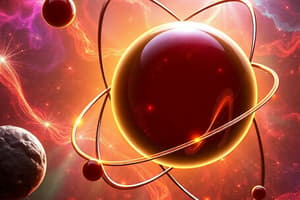Podcast
Questions and Answers
What is the atomic number of an element?
What is the atomic number of an element?
- The sum of protons and neutrons in the nucleus
- The sum of electrons and protons in the nucleus
- The number of protons in the nucleus (correct)
- The number of neutrons in the nucleus
Where are protons and neutrons found in an atom?
Where are protons and neutrons found in an atom?
- In shells or energy levels orbiting the nucleus
- In the outermost energy level
- In the nucleus at the center of the atom (correct)
- In the electron configuration
What refers to the specific arrangement of electrons in an atom's energy levels or shells?
What refers to the specific arrangement of electrons in an atom's energy levels or shells?
- Electron configuration (correct)
- Ionic bonding
- Atomic mass
- Atomic bonding
When does atomic bonding occur?
When does atomic bonding occur?
What type of bond is formed when atoms share electrons?
What type of bond is formed when atoms share electrons?
Which atomic theory describes the behavior of electrons in an atom?
Which atomic theory describes the behavior of electrons in an atom?
What are isotopes?
What are isotopes?
Which type of bond involves the transfer of electrons from one atom to another?
Which type of bond involves the transfer of electrons from one atom to another?
Why are isotopes important in understanding elements?
Why are isotopes important in understanding elements?
What is the fundamental unit of matter according to atomic theory?
What is the fundamental unit of matter according to atomic theory?
Flashcards are hidden until you start studying
Study Notes
Introduction
Atom is the basic unit of matter and is made up of protons, neutrons, and electrons. The study of atoms is crucial for understanding the structure of matter and the fundamental principles of chemistry. In this article, we will explore the topic of "Atom," focusing on the subtopics of atomic structure, electron configuration, atomic bonding, atomic theory, and isotopes.
Atomic Structure
The atomic structure of an atom is composed of three main particles: protons, neutrons, and electrons. Protons and neutrons are found in the nucleus at the center of the atom, while electrons orbit the nucleus in shells or energy levels. The number of protons in an atom's nucleus is known as the atomic number and determines the element's chemical properties. The atomic mass of an element is the sum of its protons and neutrons.
Electron Configuration
Electron configuration refers to the specific arrangement of electrons in an atom's energy levels or shells. Electrons are arranged in shells, with each shell having a specific energy level and the ability to hold a certain number of electrons. The first shell can hold a maximum of 2 electrons, the second shell can hold a maximum of 8 electrons, and so on. Electron configuration is critical for understanding atomic bonding and chemical reactions.
Atomic Bonding
Atomic bonding occurs when two or more atoms share electrons, forming a chemical bond. There are two main types of atomic bonds: ionic and covalent. Ionic bonds form when an atom transfers one or more electrons to another atom, creating a positive ion and a negative ion. Covalent bonds form when atoms share electrons, creating a stable molecule. Other types of atomic bonds include metallic, hydrogen, and van der Waals bonds.
Atomic Theory
Atomic theory is the scientific theory that explains the structure and behavior of atoms. The theory is based on the principles of matter and the concept of atoms as the fundamental units of matter. It also explains the properties of elements and their compounds, as well as the laws of chemical reactions. The atomic theory has undergone several revisions, with the most recent being the quantum mechanical model, which describes the behavior of electrons in an atom.
Isotopes
Isotopes are atoms of the same element that have the same number of protons but different numbers of neutrons. This results in isotopes having different atomic masses. Isotopes are important in understanding the behavior of elements in nature and in the development of nuclear energy. Some isotopes are produced naturally, while others are created through nuclear reactions.
In conclusion, the study of atoms and their behavior is crucial for understanding the fundamental principles of chemistry and the structure of matter. Understanding atomic structure, electron configuration, atomic bonding, atomic theory, and isotopes helps us to better understand the properties of elements and their compounds, as well as the laws of chemical reactions.
Studying That Suits You
Use AI to generate personalized quizzes and flashcards to suit your learning preferences.




